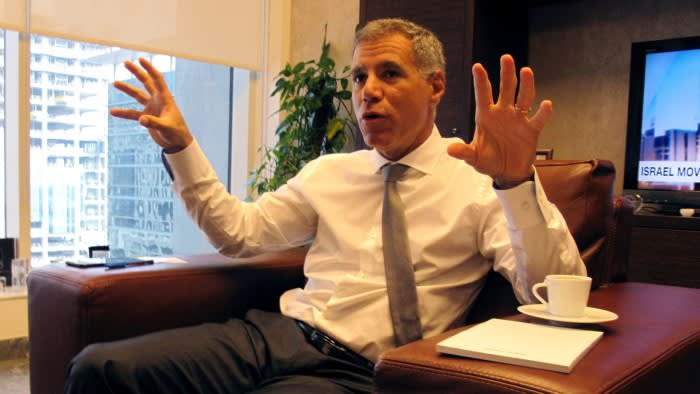HSBC chief executive Georges Elhedery’s planned overhaul of the bank has reignited debate about a break-up of the group, with one top 20 investor saying it should consider a total split between operations in the east and west.
Rajiv Jain, founder of GQG Partners, which owns an almost $800mn stake in HSBC, said the “direction” for the bank “should really be an eventual break-up”, an idea that was championed by top shareholder Ping An and shot down at an investor vote last year.
“I believe HSBC may have lost their way trying to be everything and trying to compete with the large bulge-brackets in the US, which has been an Achilles heel for a lot of the Swiss banks and UK banks,” he said in an interview with the Financial Times.
“If you take the long-term view, you’re trying to straddle two horses which are heading in different directions . . . It’s very hard to do.”
HSBC, which is headquartered in London but generates the bulk of its profits in Asia, on Tuesday announced what it described as a “simpler” structure that will see it go from three divisions and five geographic regions to four divisions and two geographic regions.
Under Elhedery’s plan, Hong Kong and the UK will become standalone units. Business in the remaining two divisions — corporate and institutional banking, and international wealth and premier banking — will be split between “eastern” and “western” markets.
Although Elhedery insisted that the bank’s strategic priorities had not changed, the division drew immediate comparison to the demands made by Ping An two years ago, when the bank’s largest shareholder called for HSBC to split off its Asia operations.
“Ping An wanted them to do this,” said one long-standing shareholder. “You could argue they’ve created more of a dichotomy between Asia and the west. It gives them more optionality if they wanted to hive off parts of the business, or if something goes horribly wrong in China, for example.”
Shareholders overwhelmingly voted against the Chinese insurer’s proposal to spin out HSBC’s Asia operations last year, in what was seen as a victory for chair Mark Tucker and former chief executive Noel Quinn.
A senior HSBC executive said the planned new structure differed significantly from the Asia split that Ping An had called for, partly because the “eastern markets” unit would cover a far larger area of the world.
The bank has in recent years sold or made plans to sell several parts of its business in what will be the “western markets” section, including operations in Canada, Greece, US retail banking and Argentina. The split would allow HSBC to remove a layer of management in the region to reflect its reduced scale, the person said.
They added that the Middle East had been included in the “eastern markets” business rather than the west in order to help build on already fast-growing ties between the region and markets such as China, India and south-east Asia.
Ping An Asset Management declined to comment.
HSBC has had to strike a delicate balance between the demands of western regulators and authorities in China and Hong Kong for decades.
However, rising geopolitical tensions between China and the west have reignited fears of potential sanctions against Chinese banks, a move that would have significant consequences for the global economy and HSBC in particular as an institution that treads a fine line between the two regions.
One person familiar with HSBC dismissed talk that the bank would consider a break-up in the current environment but said it had put itself in a position where it could take action in a worst-case scenario.
“The two islands remain islands,” they said. “The bank is future-proofing its business . . . if there are sanctions against Chinese banks, this makes it easier to immunise HSBC from that. It doesn’t cure it, only a break-up would cure that.”
HSBC’s upper ranks have been bracing for job cuts since Elhedery took over as chief executive in September with a clear mandate to reduce costs, as the windfall the bank has enjoyed from higher interest rates tails off.
The merger of HSBC’s commercial banking unit with global banking and markets is expected to hit its senior bankers, the FT previously reported.
HSBC said on Tuesday that the changes would “reduce the duplication of processes and decision making”, but gave no detail of the scale of job cuts or how much the reorganisation would cost.
A shareholder who was supportive of the reorganisation said it should help HSBC take out costs from its global units.
“It enables them to put in a more slimline efficient global bank alongside their two big local banks” of Hong Kong and the UK, the shareholder said.
The bank’s 214,000 headcount is still significantly above the target Quinn said he expected in 2020 when he announced his own restructuring plans.
Quinn, who was then interim chief while HSBC looked for a permanent replacement for John Flint before being handed the role permanently, wanted to get the full-time employee count down to 200,000 in three years.
Quinn’s restructuring of the bank, which he called “one of the deepest restructuring and simplification programmes” in its history, was largely driven by a pivot to Asia and a retreat from unprofitable markets in Europe and the US as well as investment banking.
The FT has previously reported that a merger of HSBC’s commercial bank and its global banking and markets unit could aim to save about $300mn, or about 1 per cent of the total $32bn in costs that the bank reported last year. The senior executive said the total restructuring plan was likely to aim for larger savings than this.
https://www.ft.com/content/6b537be2-629f-4153-bc95-5b3f840fed62


